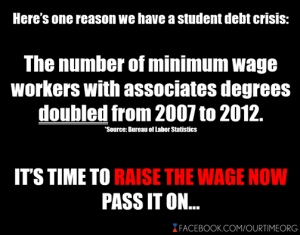St. Louis American, 1. 9.2014
 I believe economic fairness, as an issue, will dominate the airwaves, the workplace and the streets in 2014. Jobs (or lack thereof) along with employment benefits were front and center last year. Although the extraordinary mobilizations by fast-food workers were a major impetus, a growing unrest has been bubbling for some time now (Viva Occupy!). The struggles coincide with the widening gulf between the stagnated wages of workers for the last 20 years and the ballooned salaries of corporate CEOs and their companies’ obscene profits.
I believe economic fairness, as an issue, will dominate the airwaves, the workplace and the streets in 2014. Jobs (or lack thereof) along with employment benefits were front and center last year. Although the extraordinary mobilizations by fast-food workers were a major impetus, a growing unrest has been bubbling for some time now (Viva Occupy!). The struggles coincide with the widening gulf between the stagnated wages of workers for the last 20 years and the ballooned salaries of corporate CEOs and their companies’ obscene profits.
We should begin by using more accurate and descriptive words that put incomes in real context. This will help in reframing the overall public discussion about wages and counteracting the erroneous notion that workers are lazy and looking for freebies.
The first thing is to stop using the term “minimum wage.” We should replace “minimum” with ‘unfair” or “unlivable” wages. These terms are more precise and more measurable. Conversely, a livable wage is a fair or decent wage. A livable wage is the minimum hourly income that a worker needs to meet basic needs and factors given the cost of living where the worker resides.
According to the U.S. Census Bureau, 50 million of us are members of an impoverished class, with half of those in deep poverty. Another 100 million of us are just a paycheck or two from falling into the abyss of poverty.
About 27 million adults are unemployed or underemployed. The millions above in that impoverished class are forced to rely on some form of public support in order to make ends meet. Ironically, these traditional government supports have not kept up with reality (inflation, cost of living, etc.) and are under continuous assaults from Republicans.
Forbes magazine broke down the income for the average Fortune 500 CEO in 2012. It was nearly $11 million and included salary, personal perks and stock options. The best paid corporate don was John H. Hammergren of health-care company McKesson with a scandalous compensation package of $131.2 million.
When fast food workers say they can’t survive off $7.35, it’s not just a catchy slogan; it’s absolutely true. These workers are demanding a $15 livable wage.
McDonald’s response to their disgruntled workers was to suggest a ridiculous budget (dubbed the “McBudget”) that included a second job to help meet basic expenses. However, the budget expenses seemed to be from a parallel universe where human needs such as food and clothing were free.
I prefer to use the Living Wage Calculator developed by the folks at MIT who use modest figures but give a thorough look at every county in the U.S. It appears that a sizeable number of families in St. Louis and Missouri are in that impoverished class since the unlivable wage is $7.50. Just to keep us economically depressed, Missouri law requires that its wage rate stay lower than the federal rate. As someone who worked on raising the wage in the state, I’d be the first to say that $7.50 is still unacceptable – still unfair, still unlivable.
Lastly, workers cannot succumb to divide-and-conquer tactics by companies. I’ve heard and read some workers’ respond to the fast food workers’ campaign by saying they don’t deserve $15 an hour for flipping burgers. This is a put-down on the value of the workers. Even worse, it helps to maintain the slave-wage hierarchy for all workers. If you think you deserve more for what you do as a worker, you’re probably correct. Instead of us fighting one another for crumbs, join the campaign to lift all wages from unlivable to livable. Raise our voices in booming unison about economic inequities in a land of plenty.
Our duty in 2014 is to put some fire under state and federal legislators to fight for American families and communities and not engage in laws and policies that undermine the viability of both. We must actively support the worker campaigns fighting for livable wages and human dignity. When families have decent jobs and fair wages, they can participate in growing the economy, raising their families and shaping our democracy. That’s when we all will benefit.



